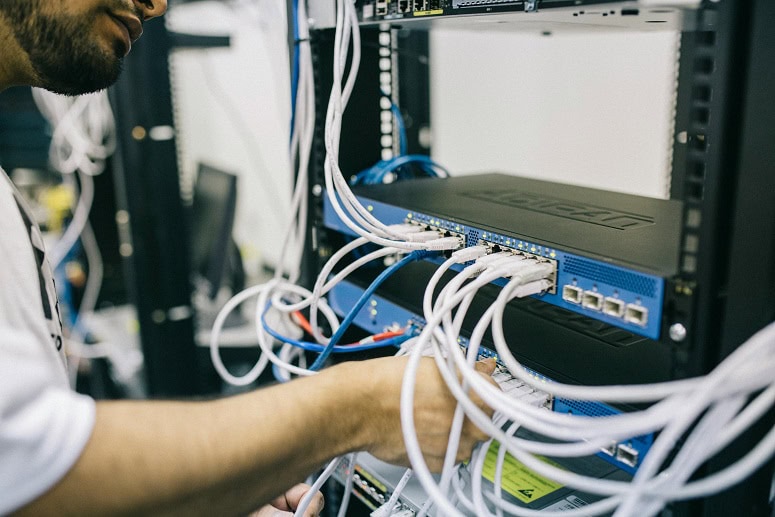Networking hardware is the backbone of our digital world. From home Wi-Fi routers to massive data centers, these devices keep everything connected. And here’s something interesting—the durability and reliability of top-tier networking hardware make it valuable even after years of use, which is why old network equipment buyers actively seek out these high-quality devices. That’s how much demand there is for solid, dependable hardware.
But who makes these essential devices? A handful of companies dominate the industry, producing the routers, switches, and firewalls that power the internet. Let’s take a closer look at the biggest names in networking hardware.
Key Players in the Networking Hardware Industry
Some companies have shaped the networking landscape for decades. Others are rising stars making waves with cutting-edge technology. Here are the giants leading the way.
1) Cisco Systems
If networking hardware had a king, Cisco would wear the crown. Founded in 1984, Cisco is a household name in enterprise networking. Their switches, routers, and cybersecurity solutions are used by businesses, governments, and internet service providers worldwide.
One reason for Cisco’s dominance? Reliability. Their products last for years, making them a go-to choice for IT professionals. Plus, they offer a robust software ecosystem, including networking automation tools and security solutions.
2) Huawei Technologies
Huawei isn’t just a smartphone brand—it’s a major player in networking hardware. The Chinese tech giant has built a global reputation for producing affordable yet high-performance networking equipment.
They’re especially strong in 5G technology and telecom infrastructure. Many internet service providers rely on Huawei for their networking backbone. However, the company has faced trade restrictions in some countries, which has shaped how it competes globally.
3) Juniper Networks
Juniper Networks may not be as famous as Cisco, but they give them serious competition. Founded in 1996, Juniper specializes in high-performance networking, particularly for large enterprises and service providers.
Their strength? Speed and scalability. Juniper’s routers and switches are designed for high-traffic environments, making them a top choice for cloud providers and financial institutions that need ultra-fast networks.
4) Arista Networks
Arista Networks focuses on one thing: data centers. And they do it exceptionally well. Their switches power some of the world’s largest cloud computing networks, including those used by tech giants like Microsoft and Facebook.
What sets them apart? Software-defined networking (SDN). Arista’s products are built with automation and flexibility in mind, making them ideal for companies running complex cloud environments.
5) Hewlett Packard Enterprise (HPE) / Aruba Networks
HPE, through its Aruba Networks division, has carved out a niche in wireless networking. Their solutions are widely used in universities, hospitals, and large office spaces.
One standout feature? AI-driven networking. Aruba’s intelligent automation helps optimize Wi-Fi performance, ensuring seamless connectivity in high-traffic areas. If you’ve connected to a corporate or campus Wi-Fi network, there’s a good chance Aruba hardware is behind it.
6) Dell Technologies
Dell isn’t just about laptops and servers. They also produce enterprise-grade networking hardware, particularly after acquiring Force10 Networks in 2011.
Their focus? Integration. Dell’s networking solutions work seamlessly with their broader IT ecosystem, making them a great choice for companies looking for an all-in-one tech infrastructure.
Other Notable Companies
These companies may not dominate headlines like Cisco or Huawei, but they play crucial roles in the networking industry.
Ericsson
Ericsson is a leader in telecom networking. They provide infrastructure for mobile networks, including 4G and 5G technology, making them essential partners for global carriers.
Their big push? 5G expansion. As more countries roll out high-speed mobile networks, Ericsson is one of the companies building the backbone to support it.
Nokia Networks
Yes, that Nokia. While they may not make the phones we all remember, Nokia Networks is a major force in telecommunications infrastructure.
They specialize in fiber-optic networking and 5G solutions. Many telecom companies depend on Nokia’s hardware to deliver ultra-fast internet to homes and businesses.
Extreme Networks
Extreme Networks focuses on enterprise networking, offering cloud-driven solutions for companies looking to modernize their IT infrastructure.
What makes them different? Customization. They provide highly flexible and scalable solutions, making them a favorite among businesses with unique networking needs.
Wrapping It Up
The networking hardware industry is packed with innovation, and the companies leading the charge are shaping the way we connect to the internet. From giants like Cisco to rising stars like Arista, each player has a unique role in keeping the world online.
Looking to upgrade your network or offload old equipment? Make sure to invest in hardware that lasts. After all, the best networking gear remains valuable long after its first deployment.
